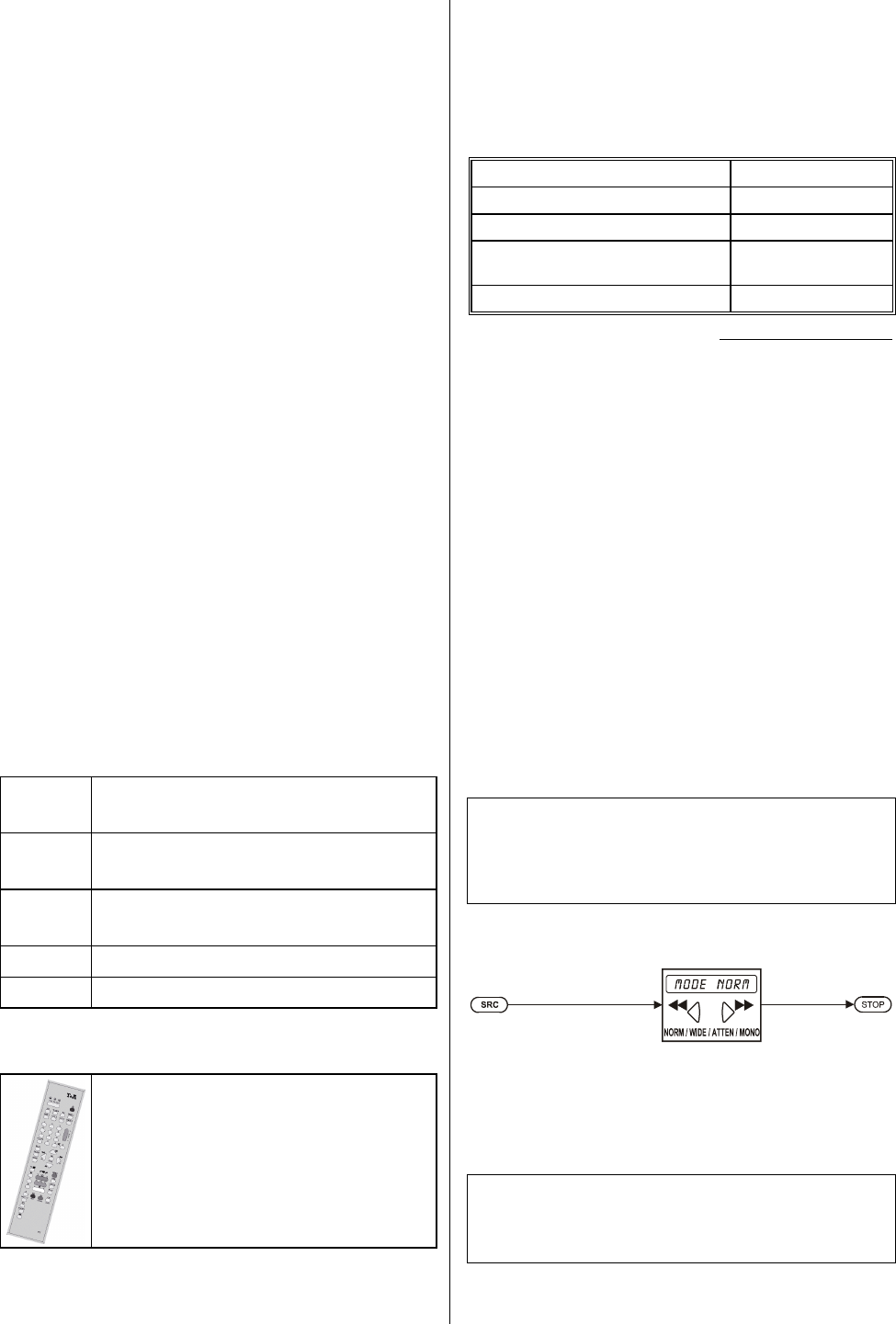
40
Special tuner functions
The Special Function menus conceal the tuner functions
which cannot be called up by their own button on the
front panel; instead they are operated using a remote-
controlled menu:
Preset menu
• Change the reception mode (MODE)
• Store and erase presets (PRESET)
• Change the normal tuner display: field strength display
or RDS station name. (RDS)
Alarm menu
• Set the Sleep timer (SLEEP)
• Select the clock setting method (TIME)
• Change the alarm settings (ALARM)
The machine features an integral clock module which is
capable of switching the unit on at a fixed time. The
'Alarm menu' provides access to all the machine’s
settings which are required for the alarm function.
The alarm function only works in tuner mode; this en-
sures that a source signal is actually present when the
machine is switched on by the timer!
The 'Alarm menu' is opened in tuner mode by a long
press on the
button.
If you open the menu, the alarm settings (preset, volume
and loudspeakers) are set automatically. The values set
(and heard) in this menu for alarm volume, alarm preset
and alarm loudspeakers are independent of the current
settings outside this menu.
Menu control system
The menu is controlled using the following buttons on the
remote control handset:
Brief press: opens the 'Preset menu'.
Long press: opens the 'Alarm menu'.
Selects the menu point.
Changes or selects within the menu points.
Activates the function shown on the screen.
Closes the menu.
Note:
If you are using the F1 system remote
control handset the menu can also be
opened by operating the
rocker.
PRESET menu
Mode
Explanation:
The tuner can be switched to any of four different
reception modes:
Reception mode Screen display
Narrow-band STEREO
MODE NAR
MODE NARMODE NAR
MODE NAR
Wide-band STEREO
MODE WIDE
MODE WIDEMODE WIDE
MODE WIDE
Narrow-band STEREO
with aerial attenuator
MODE ATTEN
MODE ATTENMODE ATTEN
MODE ATTEN
MONO
MODE MONO
MODE MONOMODE MONO
MODE MONO
The tuner’s default setting is narrow-band STEREO
('
MODE
MODEMODE
MODE NAR
NAR NAR
NAR
'). In this reception mode interference from
adjacent transmitters is effectively suppressed, and
outstanding reproduction quality is achieved even under
difficult reception conditions.
If reception conditions are very good, and if there are no
transmitters close to the selected station which could
cause interference, then switching to the '
MODE
MODEMODE
MODE WIDE
WIDE WIDE
WIDE
'
reception mode can provide even better results in terms
of sound quality, at the cost of necessarily reduced
selectivity.
If you encounter audible interference with this setting, we
recommend that you switch back to '
MODE
MODEMODE
MODE NAR
NAR NAR
NAR
'.
If you wish to pick up stations close to an extremely
powerful local transmitter, or if you are using a high-level
cable connection, intermodulation effects (whistling and
twittering sounds) may occur. In such cases we
recommend that you switch on the aerial attenuator:
screen display: '
MODE
MODEMODE
MODE ATTEN
ATTEN ATTEN
ATTEN
'.
If you want to listen to very weak or very distant stations
which can only be picked up with severe background
hiss, it is possible to switch to MONO. This reduces
background noise considerably.
Note:
In the reception mode '
MODE
MODEMODE
MODE MONO
MONO MONO
MONO
' the search threshold
is automatically reduced. The automatic station search
now stops at distant, weak and slightly ‘noisy’ stations as
well as powerful stations
Operation:
To change the reception mode press the remote control
buttons in the sequence stated above. The current
reception mode is changed by pressing the remote
control buttons
or
, and is displayed on the
screen. Any change takes effect immediately.
Note:
The stereo symbol
on the screen does not light up if a
mono transmission is picked up, or if the tuner’s recep-tion
mode has been set manually to MONO - '
MODE MONO
MODE MONOMODE MONO
MODE MONO
'.


















